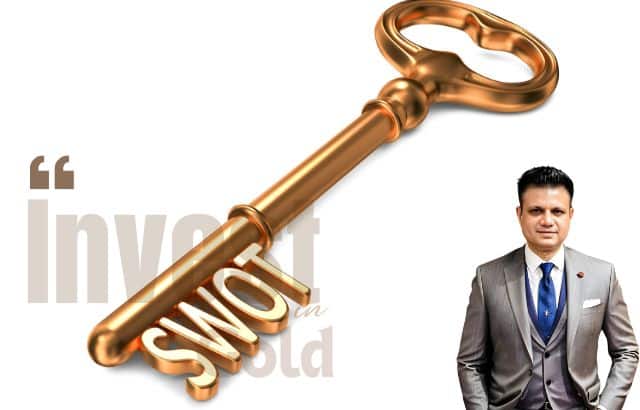Gold has long been considered a preferred investment asset due to its inherent value and ability to withstand economic downturns. In India, particularly, gold has proven to be one of the most preferred investment options due to several influencing factors such as high liquidity, diversification, and its capacity to beat inflation. Though there are phases when markets witness a fall in gold prices, these downturns tend to be short-lived, and gold always makes a strong comeback.
We recently had an insightful conversation with the world-renowned Business Strategist Hirav Shah about the prospects of investing in gold. He shared some valuable perspectives on the options available for investing in the gold industry, as well as the advantages it brings to investors.
Table of Contents
Why Invest in Gold?
Gold has intrinsic value, unlike paper currencies, which can be printed at will or devalued by inflation. Historically, gold has acted as a hedge against economic downturns, currency depreciation, and geopolitical instability. Moreover, as demand for gold continues to rise globally, its value tends to appreciate over time. Here’s why gold is widely considered a solid investment:
- Hedge Against Inflation: Gold often rises in value when inflation hits, thereby protecting your wealth.
- Store of Value: Gold has maintained its value for centuries, making it a trusted store of wealth.
- Diversification: Adding gold to your investment portfolio reduces risk, particularly in stock-heavy or bond-heavy portfolios.
- Liquidity: Gold is one of the most liquid assets globally and can be easily bought, sold, or traded.
- Global Demand: Gold continues to be in high demand in various sectors, including technology, jewelry, and central banks.
According to Hirav Shah, safety, liquidity, and returns are the three criteria that most risk-averse investors look for before making any investment. While gold meets the first two criteria seamlessly, it also delivers favorable returns over the long term. Here are two reasons why you should consider gold as part of your investment strategy:
- Inflation-Beating Investment: Over time, the return on gold investments generally aligns with the rate of inflation, making it a reliable long-term asset.
- Inverse Relationship with Equities: Gold has an inverse relationship with equity investments. If equity markets experience a downturn, gold tends to perform well, making it a valuable hedge in volatile markets.
How to Invest in Gold?
The “golden question” is: How does one invest in gold? Hirav Shah reveals that traditionally, gold investment meant purchasing physical gold, such as coins, bullions, jewelry, or artifacts. However, newer forms of gold investments have emerged, making it easier to gain exposure without the risks associated with physical gold. Two popular options include Gold ETFs (Exchange-Traded Funds) and Gold Funds.
1. Gold ETFs
- Gold ETFs are similar to buying an equivalent sum of physical gold but without the hassle of storing it. The gold is held in Demat (paper) form, so there is no risk of theft or burglary. Gold ETFs are traded on stock exchanges, making them highly liquid and easy to trade.
- Advantages: No storage or security concerns, easy to buy and sell, liquid, and transparent pricing.
- Disadvantages: Subject to management fees and market fluctuations.
2. Gold Funds
- Gold Funds invest in stocks of companies that operate in the gold industry, particularly those engaged in gold mining. A gold mutual fund may also include silver, platinum, and other precious metals in its investment basket. These funds are managed by professional mutual fund managers who use fundamental analysis to buy and sell stocks, aiming to maximize returns for investors.
- Advantages: Provides exposure to the gold industry without having to buy physical gold. Professional management and diversification reduce risks.
- Disadvantages: Market volatility and returns are not always guaranteed, and there may be management fees to consider.
What Are Gold Mutual Funds?
Hirav Shah elaborates that by investing in Gold Mutual Funds, you invest in the stocks of companies involved in gold and gold-related activities. These funds might also include other precious metals like silver and platinum, offering broader exposure to the sector. Unlike Gold ETFs, gold mutual funds are actively managed by a fund manager who adjusts the portfolio based on market conditions.
- Gold Mutual Funds can be more diversified, thus reducing individual investment risk.
- Advantages: Diversification, professionally managed, reduced risk of individual stock failures.
- Disadvantages: Returns can be volatile depending on market conditions, management fees.
Researching Gold ETFs
There are various companies offering Gold ETF stocks, and it’s crucial to research and identify the best-performing ones. Factors to consider include historical performance, cost of acquisition, and the overall stability of the ETF. If you’re unsure about which option to go for, consider seeking advice from an investment counselor to help you choose the best stock and timing for your investment.
Final Thought
Hirav Shah emphasizes that investing in gold is an excellent way to diversify your portfolio and protect your wealth from inflation, economic downturns, and currency volatility. Whether you choose to invest in physical gold, ETFs, gold stocks, or mutual funds, there are several avenues to gain exposure to the gold market. Each option has its pros and cons, so it’s essential to evaluate your financial goals, risk tolerance, and market knowledge before making a decision.
In conclusion, gold has proven to be a reliable asset for wealth preservation and diversification. Investing in physical gold requires security and storage considerations, while gold ETFs and funds offer more convenience and liquidity. However, as with all investments, there are inherent risks, and it’s crucial to stay informed and adapt your strategy based on market conditions.
Based on a SWOT (Strengths, Weaknesses, Opportunities, and Threats) Analysis, Hirav Shah concludes that:
All investments come with their own set of strengths and weaknesses. Physical gold, for instance, requires safety and storage to prevent theft. While gold is generally a safe investment, it’s not without its drawbacks. On the other hand, mutual funds offer diversification, which helps mitigate some of the risks, and they tend to be more tax-efficient compared to traditional investments. Investors must weigh these factors carefully before making their choice.
















